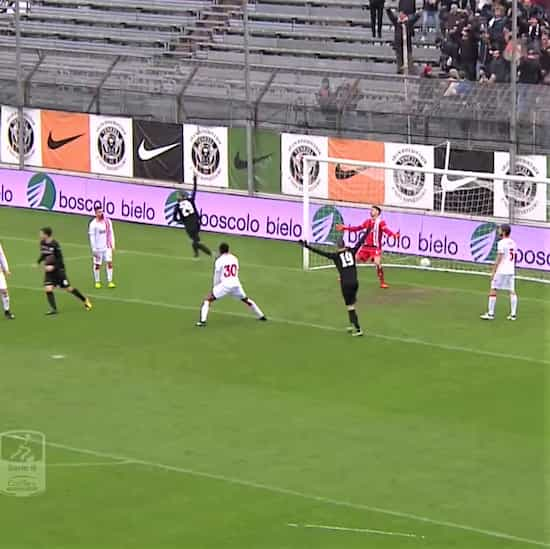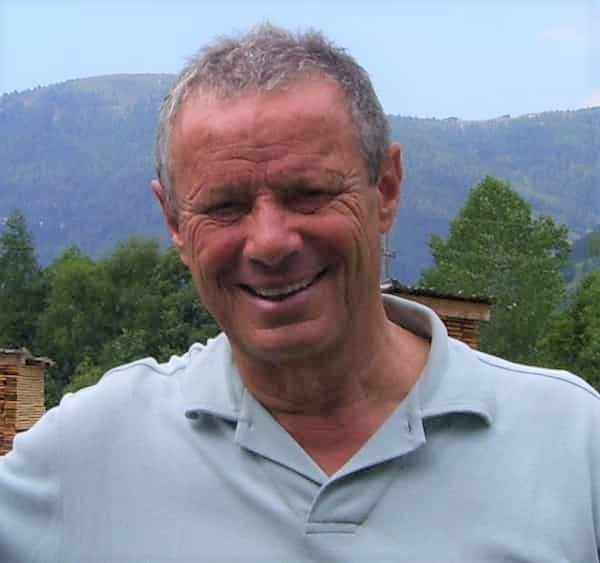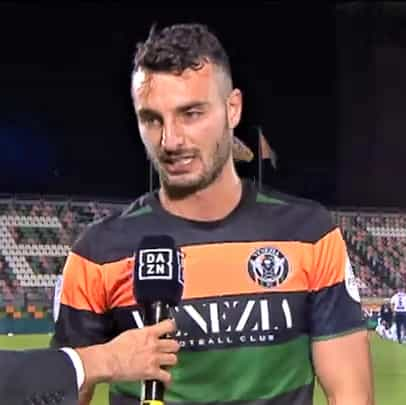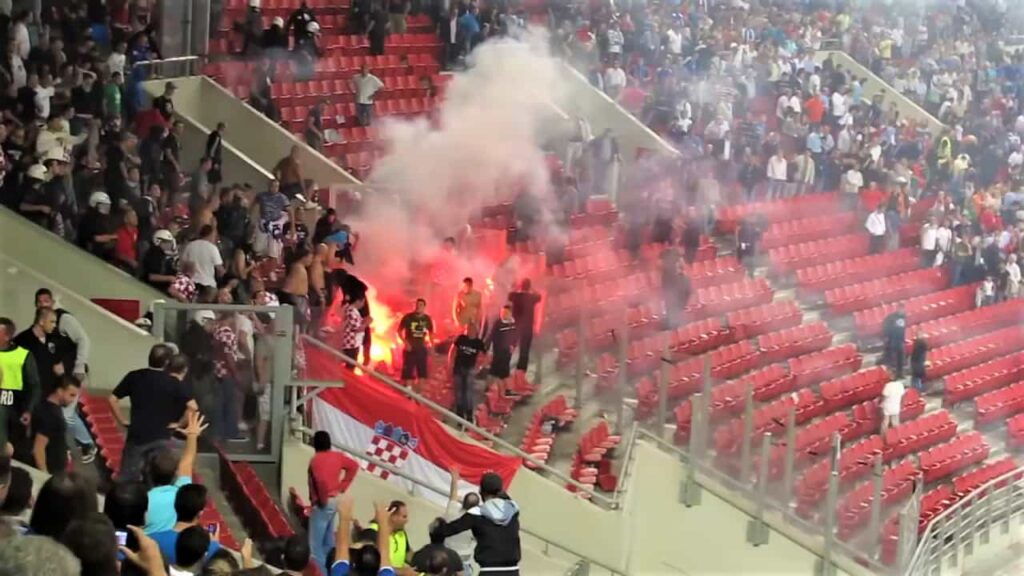On that incredible day, the 27th of May last year, 2021, on overtime in the 93rd minute, Riccardo Bocalon finally put the ball behind the Cittadella goalkeeper Elhan Kastrati. After that, the game was over. The Venice team danced and hugged each other and they could only dream of what it would have been like if the supporters had been allowed into the stadium. As it was, due to anti-covid measures, only about 200 were celebrating, but doing so outside “Penzo”.
But as soon as the news spread, more and more people gathered at Giardini, then at Arsenale, and later in the evening the whole Saint Mark’s Square was full of dancing and singing Venetians dressed in orange, black and green. Finally, after 19 years, Venezia FC. was back in the highest division, Serie A.

What football means in Italy.
Just to clarify, what we are talking about here is football, played with your feet. In some parts of the world, it is wrongly called soccer, but it still consists of a ball and… right, feet.
Someone once said that for the Italians, three things are important: Football, football, and football. To me, personally, football is further down on the list of what’s important in life, but I’m not Italian. It should also be said that all this applies to men. Italian women usually have a completely different relationship with games involving chasing and kicking a ball.
If you hear Italians (men) arguing loudly about something, it could be that they’re fighting about a woman, it could be a political discussion, but most probably they’re discussing the latest football match, and how good or bad the players were, how corrupt the referee was, and how lousy the trainer or the latest, ridiculously overpaid purchased player is.
Football is important. And your team is sometimes more important than your wife or your girlfriend. Feelings like fidelity, loyalty, love, and sacrifice are normal, and so is jealousy. A smart Italian woman should never force her man to choose between her and the team of his heart.
Another interesting fact, at least for me, is that the team that an Italian supports isn’t necessarily his home team. A person from Rome can be a supporter of a team from Milan, and vice versa. In Venice, that is not the case though.

What Venezia FC signify for Venice.
In an interview on Antennatre, a private North Italian regional television channel, the hero 1-1 scorer, Riccardo Bocalon, was introduced as a pureblood Venetian. He, himself, then continued by declaring how very Venetian he was, born just a stone’s throw from the Penzo-stadium.
There is a very strong pride in calling yourself Venetian. The incredible history of the republic maybe together with a feeling of marginalization, being a small town far away from Rome, make the Venetians want to assert themselves. This is reflected in strong political independence, separatistic movements, and sometimes in frightening manifestations like some of the ones on the holiday of April 25.
So, for Venice, I would say that the promotion to Serie A is more significant than it would have been for any other team. Let’s just hope they’ll manage to stay up there. Because looking at the team’s history, the adventure in the highest division could easily be short-lived.
The incredible comeback of the orange-black-and-green.
The match was the second in a playoff, best of two. The first was played four days before, the 23rd, in Cittadella. Venice won 0 -1. This second match didn’t start out favorably for Venezia FC. In the 26th minute, Cittadella scored, and in the 36th Pasquale Mazzocchi, orange-black-green defender was sent off the field, and Venice had to continue with 10 players.
They dug in though and tried to resist while Cittadella pushed on to score the 2-0 that would send them straight into Serie A. But somehow they never managed. Instead, Bocalon saved his beloved home team, and the rest is history.
19 years, that’s how long Venice hasn’t been playing in the top division. In that time they played seven seasons in Serie B, eight seasons in C, and four seasons in D. They also went bankrupt no less than three times. But let’s start at the beginning:
A short background.
Venezia Foot Ball Club was founded in 1907. In those days football was more or less just a group of enthusiastic youngsters kicking ball. The matches were played in the park at S:t Elena close to where the Stadium is today.
In 1913 the new stadium was ready and the following year they were promoted to the highest division. In those days, without airplanes and fast trains, the highest division was divided into two parts, north, and south. It wasn’t until 1928 that Italy got a national league.
In the interwar period, Venice changed its name and merged with smaller clubs several times. In 1940 and 1941 they were called Associazione Fascista Calcio Venezia – Venice Fascist Football Association. No big deal. Almost everything in Italy at the time had some connection to fascism.
1940, -41, and -42 were the most successful years in the history of the club. In 1941 they won the Italian Cup, and in 1942 they came third in the top national league after missing a penalty and loosing to the league-winner, Roma, at Stadio Penzo in Venice by 0 – 1.

After the war, they dropped the “fascist” label, just like everyone else, played a few seasons in Serie A, then in B, and by the 60s and 70s, it had become a rather depressing story. They were in Serie D, playing with boy scouts and seniors.
Financing the whole circus.
Then in 1987 new ideas of managing and financing were blooming. The football-loving businessman Maurizio Zamparini bought the club, merged it with AC. Mestre. With fresh money and new uniforms in orange, black, and green, the lagoon club started out the journey for the highest division again. They reach it in 1998. In 1999 they were relegated, in 2000 back in A, and in 2001 kicked out again.

In 2002 Zamparini had lost interest. He sold the club and bought Palermo instead. Unfortunately, he not only left the club, but he took 12 of the top players and the manager with him. Two days later the sporting director Rino Foschi also left the club. After that, Venice had its wings clipped. By 2005 the club was relegated from Serie B and declared bankrupt.
Later that year the club changed name to Società Sportiva Calcio Venezia. Or rather, the club re-emerged under a different label with no legal connection to the old club. A few years of struggle in Serie C before the second bankruptcy in 2009.
In 2009, the Venice Major at the time, the philosopher Massimo Cacciari founded yet a new club. This time named Foot Ball Club Unione Venezia. The club lasted two seasons before being declared bankrupt a third time.
And then, finally, in 2015, the club got its present name Venezia FC. American dollars floated in in the form of Joe Tacopina, and later Duncan Niederauer. With more stable financing, Venezia FC. could reorganize and look further than just one season at a time. New players were purchased and Stadium “Penzo” was refurbished and enlarged to 11.150 seats. If Venezia FC. should remain in Serie A even next year, it has to be increased in size to 16.500 seats according to the UEFA regulations.
This brings us to the present situation in Serie A:
Venezia FC. and the 2021/2022 standings.
Venezia FC. has never been a stable Serie A team. It has always circulated in the qualification zone, one year in A, the next in B or lower. Teams like Juventus and Inter, both well funded and from big cities, are always in top. Nowadays, the success of a team depends on economic factors more than anything else. The whole football circus is different compared to just a few decades ago.
Of the 35 players in Venezia FC’s ordinary team, 21 are non-Italians. Of the 14 Italian players, 2 are from San Donà di Piave, a few miles northeast of Venice, and maybe we should count Gianmarco Zigoni from Verona too. But that’s it. All the others come from other parts of Italy. Players are bought to the club as a part of the free transfer market and as a result of the Bosman ruling. There isn’t very much Venetian in Venezia FC. It is just a business in the hands of American billionaires.

Conclusion
But hey, didn’t you forget Riccardo Bocalon, the guy who scored the winning goal in the play-off. Yes, Bocalon is in fact Venetian. And maybe in this context, it is understandable that he wants to point that out…
-I am actually from Venice… Venetian, born just a stone’s throw from the stadium.
Because he, ladies and gentlemen, is the only one.
There’s not much to say about that. This is just how the world is rotating. Football has become an industry like any other.
What I find peculiar is the fact that the supporters, the hooligans that run around in the streets beating up fans of the other teams, and the separatistic and racist political movements that fuel off of small cities’ colorful football teams, don’t really have any foundation for their support. It’s business, no more, no less. The team you’re cheering for could very well be the opposing team next year.
But that’s my take on it…
Today, January 21, 2022, Venezia FC. is in the 17th position of 20. The three last teams at the end of the season will be relegated.
